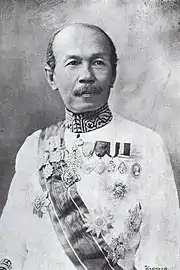Chaophraya Yommarat (Pan Sukhum)
Pan Sukhum (Thai: ปั้น สุขุม), better known by the noble title Chaophraya Yommarat (เจ้าพระยายมราช, 1862 – 30 December 1938), was a Thai government official who served several senior positions under the governments of kings Chulalongkorn (Rama V) and Vajiravudh (Rama VI).

Born in Suphan Buri, Pan was raised as a novice Buddhist monk in Bangkok and left the monkhood to join government service around the age of 21, becoming a teacher at the royal palace school and then a tutor to Chulalongkorn's children studying in England, where he served as a diplomat for 11 years. He then became commissioner of Monthon Nakhon Si Thammarat under the new monthon administration system for 12 years, and was later appointed to several successive ministerships in the reformed government system: those of Public Works, Metropolitan Affairs, and Interior. He oversaw various modernizing public works projects, including the introduction of electricity and waterworks in the capital and the establishment of a modern police force, and also established the country's first cement factory (now Siam Cement Group). He was elevated to the highest noble rank of chaophraya, receiving the title Yommarat, in 1908. He retired from public office in 1926, but was later appointed regent to the young King Ananda Mahidol (Rama VIII) in 1935, holding the position until his death in 1938.[1][2]
Chao Phraya Yommarat Hospital, the main hospital of Suphan Buri Province is named after him.
References
- โรม บุนนาค (1 May 2017). "จากเด็กที่พ่อแม่ใส่กัณฑ์เทศน์ถวายพระ! มาเป็นเจ้าพระยาที่รุ่งเรืองสุดในสมัย ร.๕ มีบทบาทถึงสมัย ร.๘!!". Manager (in Thai). Retrieved 21 April 2021.
- วิรัตน์ แสงทองคำ (20 March 2017). "วิรัตน์ แสงทองคำ : กรณีดุสิตธานี-เซ็นทรัล (2) ที่ตั้งโรงแรมดุสิตธานี ตำนานย้อนกลับยุคอาณานิคม". Matichon Weekly (in Thai). Retrieved 21 April 2021.